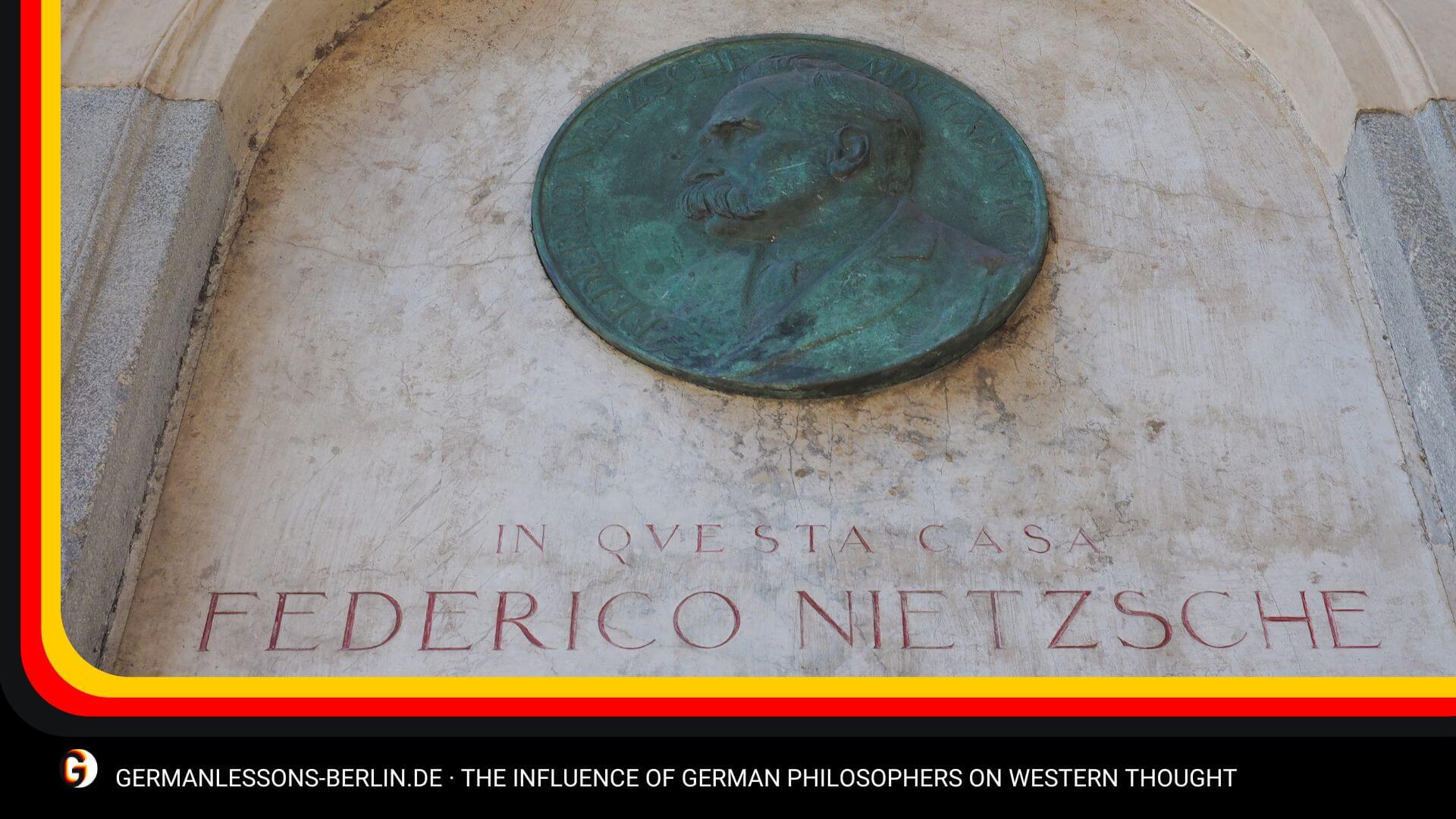You’ve probably heard of Kant, Hegel, Marx, and Nietzsche. But do you know the true impact they’ve had on Western thought? These German philosophers have reshaped our understanding of morality, history, politics, and existence itself. You’re about to delve into their groundbreaking theories and see how they’re still influencing us today. So, let’s get started and uncover the profound ways these minds have sculpted the contours of our modern world.
Table of Contents
Key Takeaways
- German Enlightenment thinkers like Gottfried Leibniz and Christian Wolff emphasized reason as the primary source of knowledge, challenging the prevailing faith-centered worldview.
- Immanuel Kant prioritized duty over personal desire and proposed the concept of universal laws to determine morality, valuing personal autonomy in moral decisions.
- Hegel’s dialectical method and historical materialism have influenced Marx’s theories on class struggle, alienation, and worker exploitation.
- Nietzsche’s philosophies have had a profound impact on Western thought, challenging traditional morality and embracing individualism, and continue to shape our understanding of the world.
The Enlightenment Era and Its German Proponents
Now, let’s dive into the Enlightenment era, where you’ll encounter the influential works of German philosophers who’ve greatly shaped Western thought. In this intellectual and philosophical movement of the 17th and 18th centuries, thinkers like Gottfried Leibniz and Christian Wolff argued for reason as the primary source of knowledge, contradicting the prevailing faith-centered worldview. They believed in logic, science, and individualism, concepts that you may find familiar today. Their writings, filled with these ideas, have become cornerstones of Western philosophy. But no discussion of German Enlightenment thinkers would be complete without mentioning Immanuel Kant. So, stay tuned as we explore the next segment: the impact of Immanuel Kant on moral philosophy.
The Impact of Immanuel Kant on Moral Philosophy
Now, let’s turn our attention to the profound impact of Immanuel Kant on moral philosophy. You’ll understand the basics of Kant’s moral philosophy and explore some of the criticisms surrounding his ethics. This will help you grasp the significance of Kant’s ideas in shaping Western thought.
Kant’s Moral Philosophy Basics
You’re about to delve into the basics of Kant’s moral philosophy, a cornerstone in Western thought. Immanuel Kant, a renowned German philosopher, introduced a revolutionary perspective on morality. Here’s a quick rundown:
- Duty over Desire: Kant prioritized duty over personal desire, emphasizing actions motivated by duty.
- Universal Law: He proposed the concept of universal laws, where an action’s morality is determined by whether it could be applied universally.
- Treat Humans as Ends: Kant believed humans should never be used as means to an end.
- Autonomy over Heteronomy: Lastly, Kant valued personal autonomy over heteronomy, stating that moral decisions should be self-governed.
Kant’s moral philosophy has significantly shaped Western thought, and it’s certainly worth your while to explore it further.
Criticisms of Kant’s Ethics
Let’s unravel the various criticisms that have been leveled against Kant’s ethics, impacting the interpretation and application of his moral philosophy. Critics argue that Kant’s ethics are too rigid, failing to consider specific circumstances in moral decision-making. You see, for Kant, a moral act is universally correct, regardless of the context.
Another critique is that Kant’s ethics are too abstract and disconnected from human emotions. He prioritizes reason over feelings, but critics argue that emotions play a crucial role in moral choices.
Lastly, Kant’s focus on duty and obligation rather than consequences has drawn criticism. This approach, critics argue, may lead to harmful outcomes if the action’s impact isn’t considered. These criticisms continue to influence discussions on Kant’s moral philosophy.
Hegel’s Contribution to Dialectics and Historical Materialism
You’re about to explore Hegel’s significant contributions to dialectics and historical materialism. You’ll examine his dialectical method and its influence on subsequent philosophical thought, including historical materialism. We’ll also consider the critiques of Hegel’s theories, which have further molded our understanding of these concepts.
Hegel’s Dialectical Method
You’ll find that Hegel’s dialectical method, a cornerstone in his philosophy, revolutionized the way we understand history and society. Hegel’s dialectics isn’t easy to grasp but is pivotal for your understanding of German philosophy’s influence.
- Thesis, Antithesis, Synthesis: Hegel’s dialectic method operates on this triadic structure. The thesis presents an idea, the antithesis opposes it, and the synthesis reconciles the two.
- Historical Progression: For Hegel, history isn’t random but a dialectical process, where each stage is a necessary progression from the previous one.
- Absolute Idealism: Hegel’s dialectics is based on the idea that ultimate reality is mental or spiritual.
- Influence on Marx: Marx transformed Hegel’s idealist dialectics into a materialist one, laying the foundation for historical materialism.
Influence on Historical Materialism
In this section, you’ll delve into two significant aspects of Hegel’s influence on Western thought: his contribution to dialectics and his impact on the development of historical materialism. Hegel’s dialectical method, which involves thesis, antithesis, and synthesis, profoundly shaped historical materialism. This philosophy holds that societal change is driven by conflicts between opposing social forces.
You’ll grasp this better with a simple table:
| Hegelian Dialectics | Influence on Historical Materialism |
|---|---|
| Thesis | Represents the status quo |
| Antithesis | Reflects the opposition to the status quo |
| Synthesis | Embodies the new state after the conflict |
| Evolution | Signifies the process of societal change |
| Conflict | Demonstrates the driving force of change |
Hegel’s Theory Critiques
Now, you’re moving on to Hegel’s theory critiques, a complex mix of thought-provoking insights and contentious ideas that have both enriched and challenged the realms of dialectics and historical materialism. Hegel’s most significant contributions can be broken down into four primary areas:
- Dialectics: Hegel’s dialectic, which involves the contradiction and resolution of ideas, has been a major influence on Western thought.
- Historical Materialism: Hegel proposed that material conditions shape society and history, a concept later developed by Marx into a cornerstone of socialism.
- Critique of Enlightenment Rationalism: Hegel critiqued the Enlightenment’s over-emphasis on reason, insisting on the crucial role of history and spirit.
- Absolute Idealism: Hegel’s theory of absolute idealism argued that reality is a manifestation of spirit or mind, sparking endless debates among philosophers.
Karl Marx’s Influence on Political and Economic Theories
You’re about to delve into the profound impact Karl Marx’s theories have had on political and economic ideologies worldwide. Marx’s concepts of class struggle, alienation, and historical materialism redefined the way we view society and economy.
Consider this table for clarity:
| Theories | Influence on Political Ideologies | Influence on Economic Ideologies |
|---|---|---|
| Class Struggle | Shaped the concept of class warfare | Influenced the idea of economic inequality |
| Alienation | Contributed to the critique of capitalism | Led to the understanding of worker exploitation |
| Historical Materialism | Influenced the Marxist view of history | Shaped the Marxist economic theory |
In essence, Marx’s theories continue to shape our understanding of the world. They’ve challenged conventional wisdom, inspiring a shift towards more equitable social and economic structures.
Nietzsche’s Existentialism and Its Impact on Western Philosophy
But, as you turn your attention to Nietzsche’s existentialism, it’s crucial to understand that his philosophies have had a profound and lasting impact on Western thought. Nietzsche proposed ideas that challenged the status quo, leading to significant shifts in philosophy and societal views.
- Nietzsche’s critique of traditional morality, where he argued for the “will to power” over “good vs evil,” shook the moral foundations of the West.
- His assertion that “God is dead,” indicating the decline of religious belief, continues to shape Western secularism.
- Nietzsche’s idea of eternal recurrence, suggesting that life endlessly repeats, has influenced perspectives on existence.
- Above all, his concept of ‘Ubermensch’ or Overman, encapsulating self-overcoming and self-creation, has inspired individualist thinking.
Nietzsche’s existentialism remains a cornerstone in Western philosophical thought.
Modern Interpretations and Applications of German Philosophical Thought
So, you’re ready to delve into the modern interpretations and applications of German philosophical thought, and it’s fascinating to see how these theories continue to shape our world.
What’s intriguing is how these ideas have been repurposed and reinterpreted in contemporary thought. Take a look at this simple table to help illustrate:
| Philosopher | Key Idea | Modern Application |
|---|---|---|
| Kant | Morality based on reason | Ethical frameworks in AI |
| Hegel | Dialectics | Conflict resolution strategies |
| Nietzsche | Will to power | Leadership development |
Kant’s ethics, for example, play a crucial role in creating moral frameworks for artificial intelligence. Hegel’s dialectics inform modern conflict resolution strategies, while Nietzsche’s ‘will to power’ concept is used in leadership development. These philosophers’ impact is still felt today, in ways you might not expect.
Frequently Asked Questions
How Has German Philosophy Influenced Contemporary Art and Literature?
You’re asking about the impact of German philosophy on modern art and literature. Well, it’s significantly shaped them! Think of existentialism from Nietzsche’s work, it’s permeated into literature, promoting self-inquiry and questioning of norms. Or consider Hegel’s dialectics, it’s influenced artistic movements like cubism, involving constant change and conflict. So, German philosophy hasn’t just influenced, it’s intertwined with contemporary art and literature.
What Are Some Common Misconceptions About German Philosophy?
You may think German philosophy is overly complex or inaccessible. That’s a common misconception. While it’s true that thinkers like Kant or Hegel present challenging ideas, they’re not impossible to understand. You might also believe that German philosophy is all about pessimism or nihilism, but that’s not the case either. It’s a rich and varied tradition with a lot to offer in terms of understanding ourselves and the world.
How Has German Philosophy Shaped Modern Educational Practices?
You’ve asked how German philosophy has shaped modern education. Well, it’s greatly influenced critical thinking development. The Socratic method, inspired by Kant’s emphasis on questioning, is widely used. Hegel’s dialectical method encourages understanding through debate. Marx’s ideas have fueled critical pedagogy. You’ll find these practices in classrooms worldwide, showing how German philosophers have profoundly impacted education.
Can You Elaborate on the Influence of German Philosophy on Religious Thought in the West?
Certainly, you can explore the impact of German philosophy on Western religious thought. You’ve got thinkers like Kant and Hegel who fundamentally challenged traditional views of religion. Kant argued that moral law, not divine command, is the basis of ethics. Hegel, on the other hand, saw God as an evolving process. These ideas shook the very foundations of Western religious thought, leading to a more questioning, critical approach to faith.
How Did German Philosophers Influence the Development of Psychology and Psychoanalysis?
You’re asking about the impact of German philosophers on psychology and psychoanalysis. Significant thinkers like Kant, Hegel, and Nietzsche challenged traditional views of the mind. They’ve played key roles in shaping our understanding of consciousness, perception, and the human condition. Their ideas influenced Freud’s development of psychoanalysis, shifting the focus to inner experiences and unconscious processes. So, you can’t ignore their contribution to these fields.
Conclusion
So, you’ve journeyed through the profound influence of German philosophers on Western thought, from the Enlightenment to present day. You’ve grasped how Kant reshaped moral philosophy, Hegel’s influence on dialectics, Marx’s impact on politics and economy, and Nietzsche’s existentialism. You’ve seen how their ideas still reverberate today. Truly, these German thinkers have left indelible marks on our world, changing the way we perceive and engage with reality.








